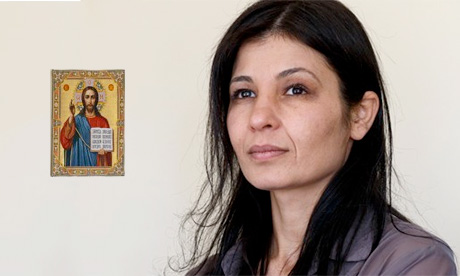An ancient faith is disappearing from the lands in which it first took root; the Middle East.
At stake is not just a religious community, but the fate of pluralism in the region.
The call came in 2014, shortly after Easter.
Four years earlier, Catrin Almako’s family had applied for special visas to the United States. Catrin’s husband, Evan, had cut hair for the U.S. military during the early years of its occupation of Iraq.
Now a staffer from the International Organization for Migration was on the phone.
“Are you ready?” he asked.
The family had been assigned a departure date just a few weeks away.
“I was so confused,” Catrin (pictured) told me recently.
During the years they had waited for their visas, Catrin and Evan had debated whether they actually wanted to leave Iraq.
Both of them had grown up in Karamles, a small town in the historic heart of Iraqi Christianity, the Nineveh Plain.
Evan owned a barbershop near a church. Catrin loved her kitchen, where she spent her days making pastries filled with nuts and dates.
Their families lived there: her five siblings and aging parents, his two brothers.
But they also lived amid constant danger.
“Everybody who was working with the United States military—they get killed,” Catrin said.
Evan had been injured by an explosion near a U.S. Army base in Mosul in 2004.
Catrin worried about him driving back and forth to the base along highways that cross some of the most contested land in Iraq.
Even after he stopped working for the military, they feared he might be a victim of violence.
That fear was compounded by their faith: During the war years, insurgents consistently targeted Christian towns and churches in a campaign of terror.
The Almakos had watched neighbors and friends wrestle with the same question: stay, or go?
Now more and more Christians in the region were deciding to leave.
The graph of the religion’s decline in the Middle East has in recent years transformed from a steady downward slope into a cliff.
The numbers in Iraq are especially stark: Before the American invasion, as many as 1.4 million Christians lived in the country.
Today, fewer than 250,000 remain—an 80 percent drop in less than two decades.
The Almakos resolved to go.
They spent their remaining time in Karamles agonizing over what to bring with them, and what to leave behind. “You don’t know what you’re going to take,” Evan told me.
“You have to discuss a lot of things: that one important, that one not important.”
In the end, choosing among their possessions proved too difficult.
They decided to leave nearly every keepsake and heirloom, including boxes of pictures of their family and of their two young children, Ayoob, then 12, and Sofya, 10.
Catrin insisted on taking one sentimental item, a small cloth weaving of Jesus made in Italy.
On the Almakos’ last night in Karamles, the people of the town descended on their house.
It seemed as if they all had a present they wanted Catrin and Evan to take to family members in America: sweets, spices, clothes.
Nothing you couldn’t find in the United States, but “you can’t tell them that,” Evan said.
People in Iraq see the U.S. as a place of bounty, he explained, but it’s still fundamentally foreign.
Of the family’s three suitcases, one was filled with these gifts from home.
One by one, each of their family members tried to persuade Catrin and Evan to stay in Karamles.
Her older brother Thabet is a priest, and the town’s most dedicated defender. “Don’t leave,”
Catrin remembers him saying. “Stay here.” Continue reading
- Image: The Atlantic
News category: Analysis and Comment.




